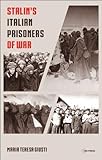Stalin's Italian prisoners of war /Maria Teresa Giusti ; translated by Riccardo James Vargiu.
Material type: TextLanguage: English Original language: Italian Description: 1 online resourceContent type:
TextLanguage: English Original language: Italian Description: 1 online resourceContent type: - text
- computer
- online resource
- 9633863562
- 9789633863565
- D805 .S735 2020
- COPYRIGHT NOT covered - Click this link to request copyright permission: https://lib.ciu.edu/copyright-request-form
| Item type | Current library | Collection | Call number | URL | Status | Date due | Barcode | |
|---|---|---|---|---|---|---|---|---|
 Online Book (LOGIN USING YOUR MY CIU LOGIN AND PASSWORD)
Online Book (LOGIN USING YOUR MY CIU LOGIN AND PASSWORD)
|
G. Allen Fleece Library ONLINE | Non-fiction | D805.65 (Browse shelf(Opens below)) | Link to resource | Available | on1184122120 |
"This volume is the English translation of the extended second edition of I prigionieri italiani in Russia (Bologna: Il Mulino, 2014), originally in Italian. For the purposes of this translation, the material has been revised and edited for an English readership."
Includes bibliographies and index.
Capture and Internment -- Russia and Prisoners of War -- In the Prison Camps -- Antifascist Propaganda -- Repatriation -- The Final Negotiations.
"This book reconstructs the fate of Italian prisoners of war captured by the Red Army between August 1941 and the winter of 1942/43. Of 230,000 Italians left on the Eastern front almost 100,000 did not come back home. Testimonies and memoirs from surviving veterans complement the author's intensive work in Russian and Italian archives. The study examines Italian war crimes against the Soviet civilian population and describes the particularly grim fate of the thousands of Italian military internees who after the September 8, 1943 Armistice had been sent to Germany and were subsequently captured by the Soviet army to be deported to the USSR. The book presents everyday life and death in the Soviet prisoner camps and explains the particularly high mortality among Italian prisoners. Giusti explores how well the system of prisoner labor, personally supervised by Stalin, was planned, starting in 1943. A special focus of the study is antifascist propaganda among prisoners and the infiltration of the Soviet security agencies in the camps. Stalin was keen to create a new cohort of supporters through the mass political reeducation of war prisoners, especially middle-class intellectuals and military élite. The book ends with the laborious diplomatic talks in 1946 and 1947 between the USSR, Italy, and the Holy See for the repatriation of the surviving prisoners"--
COPYRIGHT NOT covered - Click this link to request copyright permission:
There are no comments on this title.
